Jaguar I-Pace vs Volvo EX40 - Differences and prices compared
Compare performance (400 HP vs 442 HP), boot space and price (79200 £ vs 42800 £) at a glance. Find out which car is the better choice for you – Jaguar I-Pace or Volvo EX40?
Costs and Efficiency:
Price and efficiency are key factors when choosing a car – and this is often where the real differences emerge.
Volvo EX40 has a decisively advantage in terms of price – it starts at 42800 £, while the Jaguar I-Pace costs 79200 £. That’s a price difference of around 36352 £.
In terms of energy consumption, the advantage goes to the Volvo EX40: with 16.60 kWh per 100 km, it’s significantly more efficient than the Jaguar I-Pace with 25.20 kWh. That’s a difference of about 8.60 kWh.
As for range, the Volvo EX40 performs to a small extent better – achieving up to 576 km, about 107 km more than the Jaguar I-Pace.
Engine and Performance:
Under the bonnet, it becomes clear which model is tuned for sportiness and which one takes the lead when you hit the accelerator.
When it comes to engine power, the Volvo EX40 has a barely noticeable edge – offering 442 HP compared to 400 HP. That’s roughly 42 HP more horsepower.
In acceleration from 0 to 100 km/h, the Volvo EX40 is minimal quicker – completing the sprint in 4.60 s, while the Jaguar I-Pace takes 4.80 s. That’s about 0.20 s faster.
In terms of top speed, the Jaguar I-Pace performs hardly perceptible better – reaching 200 km/h, while the Volvo EX40 tops out at 180 km/h. The difference is around 20 km/h.
There’s also a difference in torque: Jaguar I-Pace pulls barely noticeable stronger with 696 Nm compared to 670 Nm. That’s about 26 Nm difference.
Space and Everyday Use:
Cabin size, boot volume and payload all play a role in everyday practicality. Here, comfort and flexibility make the difference.
Both vehicles offer seating for 5 people.
In curb weight, Volvo EX40 is barely noticeable lighter – 2040 kg compared to 2226 kg. The difference is around 186 kg.
In terms of boot space, the Jaguar I-Pace offers distinct more room – 638 L compared to 410 L. That’s a difference of about 228 L.
In maximum load capacity, the Jaguar I-Pace performs minimal better – up to 1453 L, which is about 53 L more than the Volvo EX40.
When it comes to payload, Volvo EX40 barely noticeable takes the win – 480 kg compared to 444 kg. That’s a difference of about 36 kg.
Who wins the race?
The Volvo EX40 proves to be leaves the rival little chance and therefore becomes our DriveDuel Champion!
Volvo EX40 is the better all-rounder in this comparison.
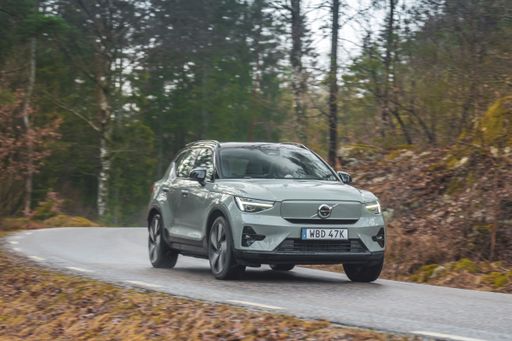
Volvo EX40
Costs and Consumption
View detailed analysis
Engine and Performance
View detailed analysis
Dimensions and Body
View detailed analysis
Jaguar I-Pace
The Jaguar I-Pace pairs instantaneous electric shove with graceful, feline looks, so it never feels like you're piloting a refrigerator with style. Inside it serves proper Jaguar luxury and clever packaging, making it a tempting choice for buyers who want EV convenience without losing personality.
details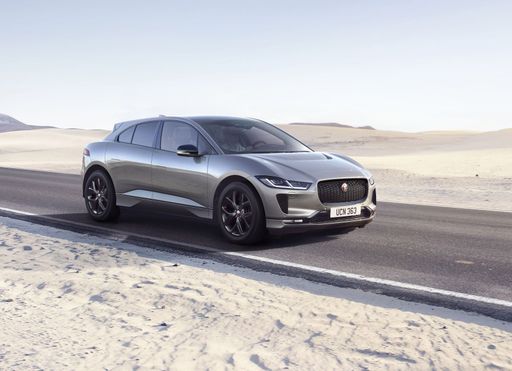
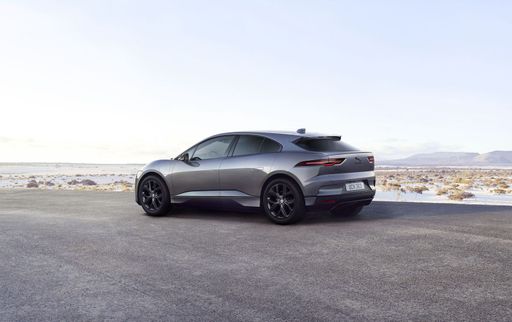
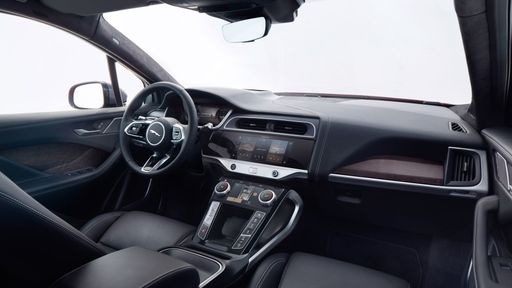
Volvo EX40
The Volvo EX40 wraps Scandinavian calm and clever practicality into a compact electric package that feels both premium and refreshingly uncomplicated. It's the grown-up answer to flashier rivals — a safe, comfy, and city-friendly EV with thoughtful tech that makes everyday driving quietly satisfying.
details
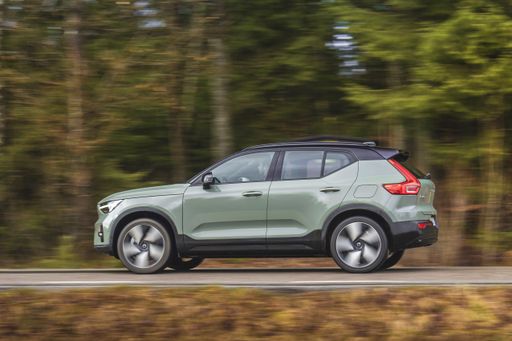
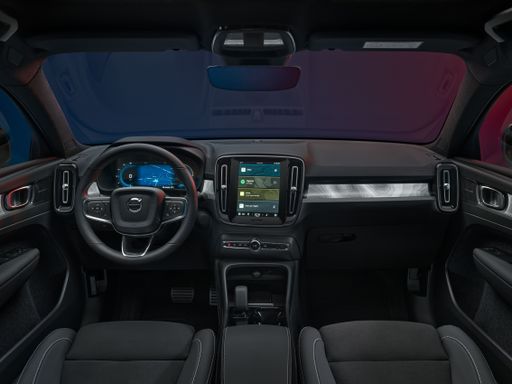

|

|
|
|
|
Costs and Consumption |
|
|---|---|
|
Price
79200 - 85500 £
|
Price
42800 - 58200 £
|
|
Consumption L/100km
-
|
Consumption L/100km
-
|
|
Consumption kWh/100km
25.20 kWh
|
Consumption kWh/100km
16.6 - 17.6 kWh
|
|
Electric Range
469 km
|
Electric Range
480 - 576 km
|
|
Battery Capacity
84.70 kWh
|
Battery Capacity
67 - 79 kWh
|
|
co2
0 g/km
|
co2
0 g/km
|
|
Fuel tank capacity
-
|
Fuel tank capacity
-
|
Dimensions and Body |
|
|---|---|
|
Body Type
SUV
|
Body Type
SUV
|
|
Seats
5
|
Seats
5
|
|
Doors
5
|
Doors
5
|
|
Curb weight
2226 kg
|
Curb weight
2040 - 2170 kg
|
|
Trunk capacity
638 L
|
Trunk capacity
410 L
|
|
Length
4682 mm
|
Length
4440 mm
|
|
Width
2011 mm
|
Width
1863 mm
|
|
Height
1566 mm
|
Height
1647 mm
|
|
Max trunk capacity
1453 L
|
Max trunk capacity
1286 - 1400 L
|
|
Payload
444 kg
|
Payload
430 - 480 kg
|
Engine and Performance |
|
|---|---|
|
Engine Type
Electric
|
Engine Type
Electric
|
|
Transmission
Automatic
|
Transmission
Automatic
|
|
Transmission Detail
Reduction Gearbox
|
Transmission Detail
Reduction Gearbox
|
|
Drive Type
All-Wheel Drive
|
Drive Type
Rear-Wheel Drive, All-Wheel Drive
|
|
Power HP
400 HP
|
Power HP
238 - 442 HP
|
|
Acceleration 0-100km/h
4.80 s
|
Acceleration 0-100km/h
4.6 - 7.3 s
|
|
Max Speed
200 km/h
|
Max Speed
180 km/h
|
|
Torque
696 Nm
|
Torque
420 - 670 Nm
|
|
Number of Cylinders
-
|
Number of Cylinders
-
|
|
Power kW
294 kW
|
Power kW
175 - 325 kW
|
|
Engine capacity
-
|
Engine capacity
-
|
General |
|
|---|---|
|
Model Year
2023
|
Model Year
2024
|
|
CO2 Efficiency Class
A
|
CO2 Efficiency Class
A
|
|
Brand
Jaguar
|
Brand
Volvo
|
What drivetrain options does the Jaguar I-Pace have?
Available configurations include All-Wheel Drive.
The prices and data displayed are estimates based on German list prices and may vary by country. This information is not legally binding.
